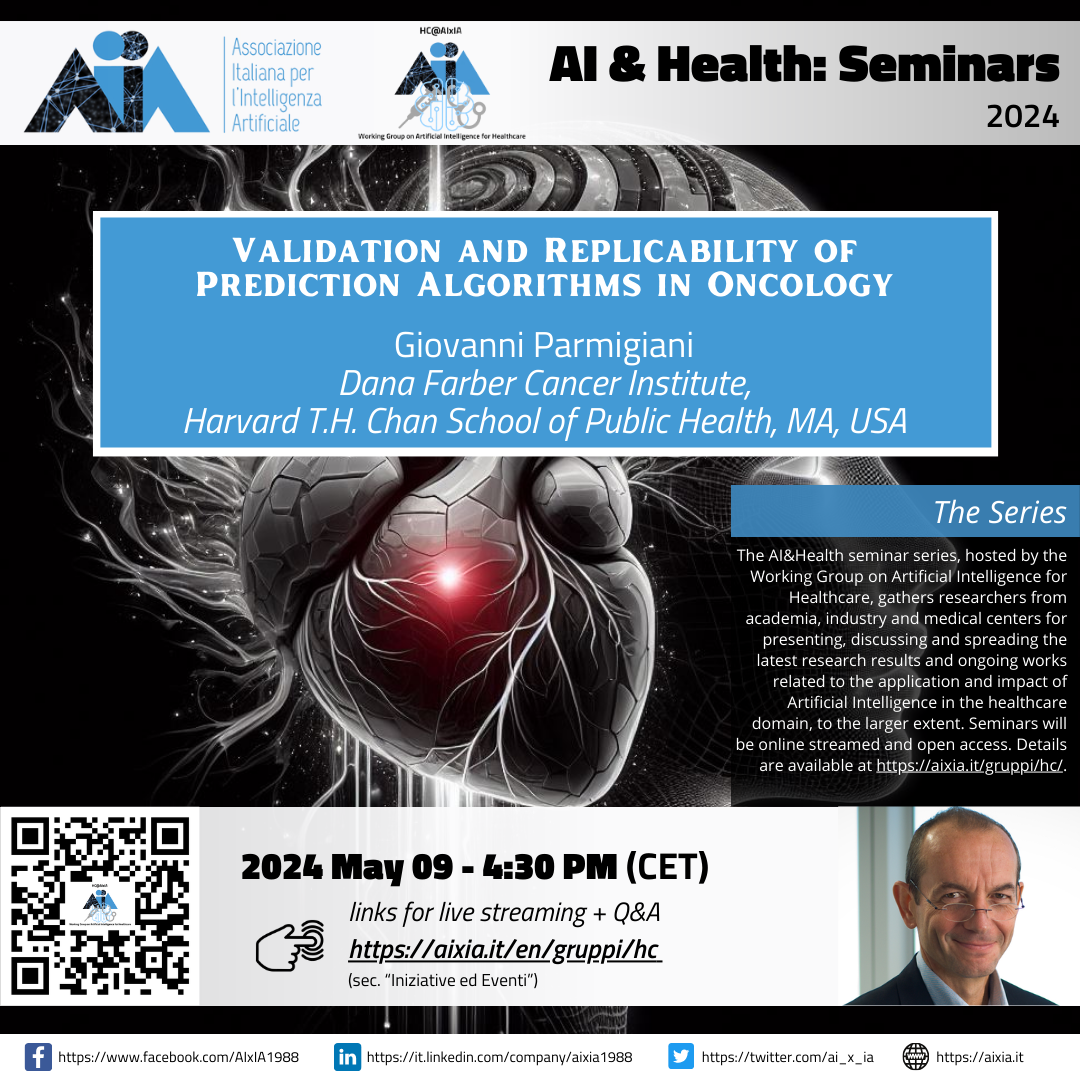- From: Francesco Calimeri <francesco.calimeri@unical.it>
- Date: Mon, 6 May 2024 12:46:39 +0200
- To: hc-aixia <hc-aixia@googlegroups.com>
- Cc: hc-aixia-members@googlegroups.com
- Message-ID: <CAB4i8BFHbpBxHPHPjVti1CvQf3+L-gM1Ucko8P9OR1DV+2EGSw@mail.gmail.com>
Dear Madam/Sir, This is to officially announce the FOURTH seminar of the "AI & Health" series as hosted by HC@AIxIA, i.e., the "Artificial Intelligence for Healthcare" working group of the Italian Association for Artificial Intelligence. *Save the date: 09 MAY, 2024.* We hope you will attend and participate in the discussion on the relevant topics that will be presented and by our speakers. *Feel free to share this with those potentially interested.* Please find some details below, and a poster attached. All directions for participating are available at https://aixia.it/gruppi/hc/. *== Are you interested in Joining the group? ==* Please head to https://aixia.it/en/gruppi/hc/ fo find out how. Do not hesitate to contact us at hc-aixia@googlegroups.com for any information or clarification. Thank you for your interest in the AI & Health seminar series and the HC@AIxIA working group, and see you soon! Sincerely, Francesco Calimeri, Mauro Dragoni, Fabio Stella (coordinators of the HC@AIxIA working group) *== May 2024 seminar ==* *Link to participate: * https://unimib.webex.com/unimib/j.php?MTID=m9525dde973507802c873fbe7d3e091f4 *2024 MAY 09 - 4:30PM CET* *Giovanni Parmigiani* Dana Farber Cancer Institute, Harvard T.H. Chan School of Public Health, MA, USA *Title*: Validation and Replicability of Prediction Algorithms in Oncology *Abstract*: This lecture considers replicability of the performance of predictors across studies. We suggest a general approach to investigating this issue, based on ensembles of prediction models trained on different studies. We quantify how the common practice of training on a single study accounts in part for the observed challenges in replicability of prediction performance. We also investigate whether ensembles of predictors trained on multiple studies can be combined, using unique criteria, to design robust ensemble learners trained upfront to incorporate replicability into different contexts and populations. In a linear regression setting, we show analytically and confirm via simulation that merging yields lower prediction error than cross-study learning when the predictor-outcome relationships are relatively homogeneous across studies. However, as heterogeneity increases, there exists a transition point beyond which cross-study learning outperforms merging. We provide analytic expressions for the transition point in various scenarios and study asymptotic properties. *Short Bio*: Giovanni Parmigiani's research investigates statistical principles and tools, often with a focus on understanding cancer data. He has a long-term interest in helping families who are susceptible to inherited cancer understand their risk and make informed decisions. He uses Bayesian modeling and machine learning concepts to predict who is at risk of carrying genetic variants, and to integrate literature-based and other information about the effects of mutations. Through his three-decade long experience implementing machine learning approaches in clinical activities, he identified replicability across populations and heath systems as a key roadblock to rational use of machine learning in health. He is addressing the challenges of cross-study replication of predictions, by designing a variety of prediction approaches that learn replicability via training on multiple studies at once. Throughout his research activities, his broad goals are to find innovative ways to use data science and data technologies to fuel cancer prevention and early detection and, methodologically, to increase the rigor end efficiency with which we leverage the vast and complex information generated in today’s cancer research. He strives to foster the use of data sciences as a common thread to facilitate interactions between fields and academic cultures, and has a passion for mentoring and training young(er) scientists in interdisciplinary settings. He is the Associate Director for Population Sciences of the multi-institutional Dana-Farber / Harvard Cancer Center (DF/HCC), and is the director of the postdoctoral training grant in Quantitative Sciences for Cancer Research at the Harvard T.H. Chan School of Public Health. His home is in the Department of Data Science at Dana-Farber Cancer Institute, of which he has been the Chairman from 2009 to 2018. He has also been the faculty Leader of DF/HCC's Biostatistics and Computational Biology Program (now Cancer Data Sciences Program) from 2009 to 2015. [image: HC@AIxIA - Seminars AI & Health 2024 - Locandina 05.png]
Attachments
- image/png attachment: HC_AIxIA_-_Seminars_AI___Health_2024_-_Locandina_05.png

Received on Monday, 6 May 2024 10:47:07 UTC